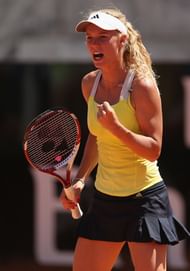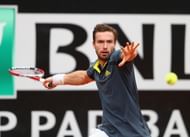Tennis is a game of personalities. In many ways, that is why we watch the sport. A Rafa Nadal fan adores him as much for his fierce intensity as for his heavy top-spin forehand. A Federer believer admires his ice-cool attitude as much as his silky-smooth service motion. And we would always love to know them a bit better. What was going through his mind when he was down set point in that game? Does she really think her opponent serves like a man? Where did he have dinner yesterday?
In that context, interviews and post-match press conferences are a goldmine of information, both critical and irrelevant. So, as we come to the end of a captivating and rain-filled first week at Roland Garros, here are a few choice quotes from around the courts.
“It’s very strange, but here, it’s magic here. It’s a place where I feel really good, and, I can go beyond myself and play a type of tennis I wouldn’t even think of. Even today before the match, if people told me, ‘You are going to play four hours with such a score,’ I wouldn’t have believed it.’ So there is magic to some extent.”
- Gael Monfils explains his relationship with Court Philipp Chartrier, after an improbable first round victory over Thomas Berdych
Monfils attempts to explain the unexplainable, and ends up with ‘magic’. But how hard-to-believe has his run at Roland Garros so far actually been? Monfils has always been a character who feeds off crowd’s energy; a showman who is at his best when playing to the gallery. Time and again, he has performed above his level when it comes to the biggest of stages. What has been impressive this time around though, has been the sense of control and maturity that he has brought to his game and attitude. No flashy, needless in-betweener shots, no unnecessary energy (not too much anyway) exerted in wild celebrations after each successful point. Combine this new-found approach with the most prestigious centre court in France in front of a fully supportive home crowd, and we might begin to understand the magic after all.
“My dad’s still my coach, and he’ll always be, because I grew up with him and he knows me better than everyone else”
- Bernard Tomic provides a clarification on the coaching status of his father
Tomic presents a common feature of the modern professional tennis world – an intense parent-child relationship that blurs the lines between family, coach and support system. Every Dokic, Williams, Hingis, Agassi or Nadal (uncle in his case) has an immediate family member to thank for planting them firmly, for better or worse, in the world’s tennis spotlight. But the gradual yet relentless change in dynamics between the player and parent that inevitably occurs over time has always been a thorny issue to handle. Especially when, as in Tomic’s case, there have been serious off-court problems to get distracted with. The situation becomes incredibly complicated because the relationship is much more than just a professional one. In the end, when Bernard says that John Tomic is still his coach, the implicit point he ends up making is that, more than anything else, he is still his Dad.
“Definitely I feel like clay probably is not my favourite surface”
- Caroline Wozniacki reacts to her exit from Roland Garros
Wozniacki is another tennis player with a complicated parent-coach relationship, but that can hardly be the primary factor behind her poor showing at the French Open and the clay season this year. She herself blames the incompatibility between her game and red clay, but that again is too simplistic a reason. True, she doesn’t have the power required to hit through the ball on slow courts, yet she has excellent defensive skills and a persistent doggedness about her, important traits for clay court success. Perhaps, it just boils down to the current levels of confidence for the player. And if a change in surface is going to help give her a fresh perspective on her tennis, more power to her. The best approach for Wozniacki now might be to just shut the last few months out of her mind, and look forward to the green grass over the next month and the hard courts that lie promisingly beyond.
“It is what it is. It will happen, so gotta be ready. Next time I’ll wave maybe.”
- Grigor Dimitrov responds to paparazzi hounding him and girlfriend Maria Sharapova
In a sport where the spotlight is incessantly trained on the individual, it is important to know which aspects of your life you can control and which you cannot. Nadal has commented on how his obsessive tendencies with minor aspects of his game are partly a response to the wide range of issues in the world he has no control over. In Dimitrov’s case, world-weary resignation, with a tinge of humour, seems to be the way to go. Interestingly, Dimitrov seems to be the type who actually thrives with this type of publicity. His game has gone up a few notches roughly in the same period he has been romantically linked with Sharapova. Correlation analyses in these situations are always hazardous, but it must be said that Dimitrov himself credits his good play to words of advice received from his star girlfriend. Whatever the reasons, his form will be put to the ultimate test when he attempts to repeat his feat of dismantling Djokovic, this time in the third round at Roland Garros in a best-of-5 situation.
“You have to fight and you have to suffer, and that’s exactly what I went through. I think throughout my entire career I have experienced many matches of this type. You have to have sufficient humility just to recognize that your opponent at that particular point in time is playing better than you and you have to wait for the situation to change and find a solution.”
- Rafael Nadal explains how he got past his first round initial hiccup against lowly-ranked Daniel Brands
Humility, struggle and suffering have long been Nadal’s favourite go-to attributes in any discussion revolving around his tennis. His interviews are always interesting for the unique brand of philosophy that shines through – down-to-earth, passionate and, well, humble. Critics tend to find this cloak of humility self-serving for Nadal. This might be true, but it doesn’t make it any less genuine. I believe it is this awareness of his own tennis mortality that gives him the edge in crucial moments during a match, that makes him so dangerous when he is up against the odds, that enables him to make such a stirring comeback after seven months out of the game. This year in Roland Garros, he seems to be taking this concept to the next level though. In both his first two rounds, he has needed to lose the first set against lowly opponents, before his instinctive awareness for survival has kicked in. But perhaps, that is just Rafa all over again, no?
“I respect Roger, Rafa, Novak and Murray, but their interviews are boring….I do not want to hear in an interview a guy who I will not name, but who I know well thinks all his opponents are a*******, putting on an act….I would like interviews to be more like in boxing…they bring what their fans want: war, blood, emotion. All that is missing in tennis, where everything is clean and white, with polite handshakes and some nice shots”
- Ernests Gulbis elaborates on all that is wrong with the game today
Gulbis, in more ways than one, is the polar opposite of Nadal. The Latvian playboy could never be accused of playing humble. He has always had an inclination to let it rip, both on the court and in the press room. And though the ball seems to be finding the mark more regularly these days, the words continue to be all over the place. Yet, he does bring up an interesting point here. If we look past his plea for pre-boxing-like trash talk, he talks about the need for top players to be more open and honest, and not hide behind a sheen of false geniality and civility. Ironically, it’s the millionaire’s son who is making a case here for making the game more blue-collar, for removing the elitist tag that is usually attached to tennis. And, according to him, the top players could take an important step in that direction by being more transparent, and thus more relatable, to the common fan. While this is debatable, it is quite true that the top players hide behind a façade of stock answers and glassy smiles in the public domain. But can they really be blamed, given the huge stakes at hand in their brief and precarious reign at the top? The last thing they need is unnecessary distraction from negative publicity because of a heartfelt but controversial quote. Even Djokovic, the uproarious Djoker of once-upon-a-time, has largely turned sober after his ascent to the throne. It might be safe to say, therefore, that political correctness is the price one pays for conquering the tennis world. That still doesn’t stop us from wondering, though, who Gulbis’ ‘guy who I will not name’ might actually be.
Responses to Gulbis’ outburst came from the Big Four, and they were a mix of agreeable sympathy and contentment with status quo. I personally found Federer’s response to Gulbis’ comments the most hilarious, at least the version that trended on Twitter.
“I understand him; our interviews are not always the most exciting. But that’s not just our fault. After all, we have to give so many more press conferences.”
Enough said.
What is the foot injury that has troubled Rafael Nadal over the years? Check here


